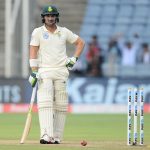2019, a cricketing year to regret and forget
The administrative shenanigans of Cricket South Africa eclipsed the Proteas’ dismal performance in the Cricket World Cup, bringing the game to its knees.
Author:
18 December 2019

As South African cricket braces itself for the English over the heart of the summer and then the challenges of 2020, it will also have to reflect wearily on a lugubrious 2019. On and off the field, it was annus truly horribilis.
From a first-ever series loss to Asian opponents – Sri Lanka – on home soil to a pathetic ICC World Cup, a flood of retirements and then a humbling experience in India, it has never been a leaner time to be a South African national player. Or supporter.
And yet, even those performances have been usurped in the headlines by some highly concerning events off the field. The administration of the game has come under ever closer scrutiny, culminating in the resignation of several board members and the suspension – with full pay – of Cricket South Africa (CSA) chief executive Thabang Moroe in early December.
The last rites for the status quo were hastened by an ill-advised flexing of power against several leading journalists, whose accreditations were temporarily revoked for writing critically about the state of affairs at the CSA.
In this era of social media and the wildfire-like spreading of news – good, bad and ugly – the stance taken against five senior journalists was shambolic. It was an abuse of power that brings to mind a key scene in the cult film American Gangster, starring Denzel Washington and Russell Crowe.
Related article:
Mobster Frank Lucas (Washington) is confronted by his mother (the late Ruby Dee) when he retaliates by going after the cops when their net closes in on his drug operation. “Even they [his family] know that you don’t shoot cops … The only one who doesn’t seem to know that is you,” Dee’s character challenges. “Do you want to make things so bad for your family that they will leave you?”
You can turn a blind eye to a lot of things, but shooting the police was a surefire signal that Lucas had lost it.
You don’t shoot cops.
You don’t ban journalists for doing their jobs.
Consequences of brazen conduct
The rebuke to Moroe’s actions was brutal.
Standard Bank said it would not be renewing its R100 million-a-year sponsorship in April. Former sponsors and current partners also stood up and condemned the bullying actions of the CSA.
You don’t shoot cops.
Board members started dropping, some leaving with serious allegations as footnotes. Bad governance. Rampant credit card abuse. A terrible working environment. These are damning allegations, of both the administration and the board that is left behind. Those who left on principle cited a broken vessel whose voyage was destined for nothing but the rocks.
Those board members who have stubbornly stayed put, including long-serving president Chris Nenzani, have shown an incredibly thick skin in the midst of calls for a new beginning from the public and private sectors.
Related article:
It is astonishing to consider that they see nothing wrong with some of the decisions over which they have presided, and that they feel the game will be best served with them still at the helm.
Eastern Province Cricket president Donovan May, perhaps well aware on which side his bread is buttered, came out in support of the battered board, saying they were doing a fine job and that it was the media casting them in a negative light.
That is quite a stance, given the scale of the financial problems South African cricket is facing. And the current board is as complicit in the mess as it can be. It was on their watch. How they anticipate to change perceptions is something to ponder.
Sweeping, but interim changes
The guidance of former International Cricket Council (ICC) chief executive Dave Richardson is well-meaning. But how much of an impact could he have, realistically, against such an immovable force. Now, it is up to interim chief executive Jacques Faul of the Titans and interim director of cricket Graeme Smith to pick up and glue back together the thousand tiny pieces into which cricket in South Africa has shattered.
The former is tasked with bringing corporate sponsors back to the negotiating table, while the latter has to get the game back on a path to success and stability.
It is difficult to say who has the tougher job, but neither of them has much time in which to do it. Interim has become the cricketing term of the summer, and it is in the interim that they must win over their sceptics.
Smith has taken to the task by speaking of “cutting the crap” and hiring former teammate Mark Boucher as the head coach. Previous interim coach Enoch Nkwe is Boucher’s assistant, as the road heading towards the 2023 World Cup starts in earnest. Smith has admitted privately that it may be the biggest challenge of his career, given the scale of the mandate. And Boucher has likened the Proteas to a wounded buffalo.
There is a domestic programme to revitalise. Several talented but wayward young players to put on the right path. A successor for Proteas captain Faf du Plessis to groom. Fans to win over. But mostly, there is a culture of pride to instil once more in South African cricket.
All areas
The Under-19 side host a Cricket World Cup in January and February. Ordinarily, they would be champing at the bit for a chance to play at home for a major trophy. But there is a quiet caution, given their poor results in the past 18 months.
The women’s side is in a state of rebuilding, too. The A side must once again have a defined role in the system, beyond merely appeasing those who haven’t quite made the cut.
And there is a lot that must happen between Boxing Day and season’s end for the national men’s team, when the interim management programme comes to an end and its injection of ideas assessed.
The first quarter of 2020 is massive for the game in South Africa. The English side will no doubt arrive with a World Cup-winning strut and will take some beating. A series win over England would be immeasurable, although crucial cogs will need some time to really fall into place.
Psyche and successes
Despite a depressing year, cricket still occupies an important place in the South African psyche. That much could be gleaned from the heated debates and laments online at any news from the high offices over the past few weeks. Former players, administrators, fans, commentators … even international rivals voiced concern about where things are headed.
And yet despite the mess, an entertaining Mzansi Super League played out to a perfect finish in Paarl on Reconciliation Day. There was a full house, a glut of stars and the kind of atmosphere the creators of the tournament surely envisaged.
Related article:
Somehow, a financial and commercial plan has to be made for the tournament because its cricketing impact was plain to see. Ask rookie Thando Ntini how much he learnt by sitting in the same sheds as his national captain, along with the evergreen Henry Davids and cunning Sri Lankan Isuru Udana over the past two months. That kind of experience is priceless.
The cricket is world-class but the tournament cannot continue in its current freebie state. It is unsustainable. This promising platform, like many issues in South African cricket, requires some frank decision-making.
In the interim, there are more pressing matters. If Santa had asked the CSA if it had been good this year, it would have struggled to look him in the eye. If he had then asked what the body really, really wanted under its Christmas tree this year, it might have said a broadcast deal, a headline sponsor for the next decade and, cheekily, an ICC title in 2020.
It has been a tough old year for cricket in South Africa and all those involved are likely glad it’s over. Next year holds the promise of a better outlook, although they know all too well that talk is cheap. Now is the time for decisive action, for all those on board.
Especially that board.



